Razo 10 mg
Razo 10 mg is a proton pump inhibitor, which is an antiulcer medication used to treat duodenal ulcers, gastro-oesophageal reflux disease (reflux of gastric contents into the oesophagus), heartburn, erosive oesophagitis (acid-related damage to the lining of the oesophagus), Helicobacter pylori infections when given with an antibiotic, and Zollinger-Ell
Razo 10 mg acts by inhibiting the action of the gastric proton pump enzyme, which is responsible for acid production. This aids in the reduction of acid production, the healing of ulcers, and the prevention of future ulcers.
30 minutes before eating, take 10 mg of Razo. Razo 10 mg tablets should be consumed whole with a glass of water; chewing or crushing the tablet is not recommended. The injection form of Razo 10 mg will be administered by a healthcare expert; do not self-administer. Depending on your medical condition, you should take Razo 10 mg for as long as your doctor has prescribed it. Headache, dizziness, diarrhea, constipation, nausea, vomiting, flatulence (wind), weakness, flu-like symptoms, back pain, pains, infection, difficulty sleeping, cough, sore throat, and runny nose are some of the typical side effects. The majority of these adverse effects do not necessitate medical treatment and will subside with time. However, if you are experiencing these adverse effects on a regular basis, you should consult your doctor.
If you have a stomach tumor or liver condition, tell your doctor before using Razo 10 mg. Long-term usage of Razo 10 mg may result in low magnesium and vitamin B12 levels, as well as an increased risk of bone fractures. If you’re pregnant or breastfeeding, don’t take Razo 10 mg. Because Razo 10 mg can cause dizziness and tiredness, you should only drive if you are fully awake. Because the safety of Razo 10 mg has not been demonstrated, it should not be administered to youngsters. Avoid drinking alcohol while taking Razo 10 mg because it can cause sleepiness and increase stomach acid production. To rule out any negative effects, keep your doctor updated about your health condition and medications.
Gastro-oesophageal reflux disease (GERD), duodenal ulcers, and Zollinger-Ellison syndrome are all treated with Razo 10 mg.
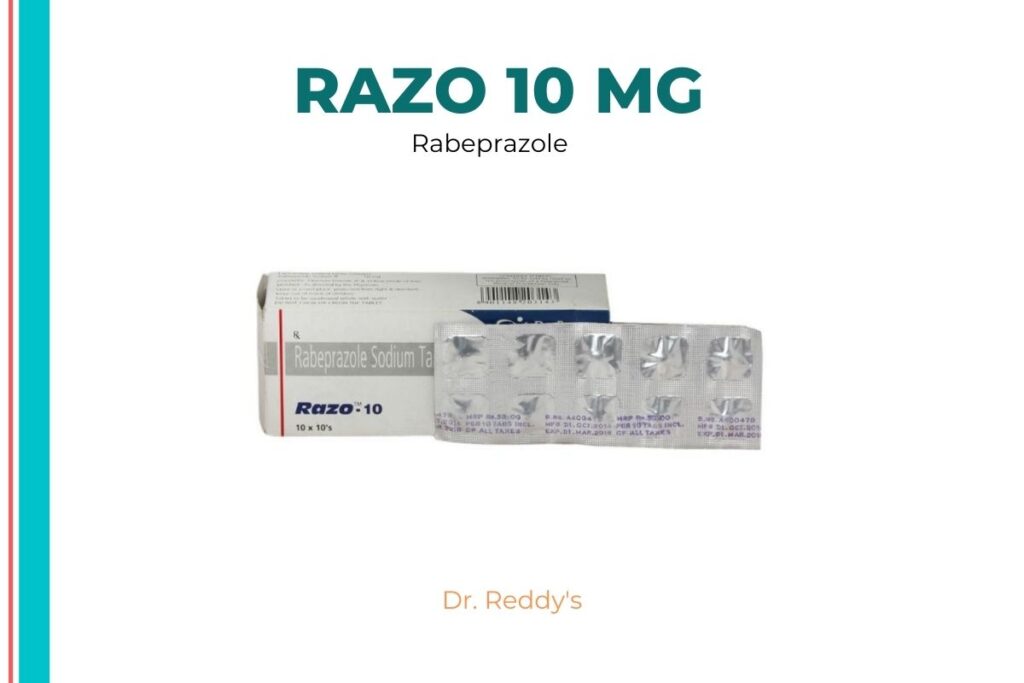
Medicinal Advantages
Razo 10 mg is a proton pump inhibitor, which is a type of antiulcer medication. Duodenal ulcers, gastro-oesophageal reflux disease (reflux of gastric contents into the oesophagus), heartburn, erosive oesophagitis (acid-related damage to the lining of the oesophagus), Helicobacter pylori infections when given with an antibiotic, and Zollinger-Ellison syndrome are all treated with Razo 10 mg. Razo 10 mg acts by inhibiting the action of the gastric proton pump enzyme, which is responsible for acid production. This aids in the reduction of acid production, the healing of ulcers, and the prevention of future ulcers.
Use Instructions
30 minutes before eating, take 10 mg of Razo. Razo 10 mg tablets should be consumed whole with a glass of water; chewing or crushing the tablet is not recommended. The injection form of Razo 10 mg will be administered by a healthcare expert; do not self-administer. Your doctor will determine how long you should take Razo 10 mg based on your medical situation.
Store in a cool, dry location away from direct sunlight.
Razo 10 mg Side Effects
Headache
Dizziness
Diarrhea
Constipation
Nausea
Vomiting
Irritable bowel syndrome (wind)
Weakness
Back discomfort, pains, infection, difficulty sleeping, cough, sore throat, and runny nose are some of the most frequent flu-like symptoms.
Precautions and Warnings in Depth
If you are allergic to any of the ingredients in Rabeprazole, do not take it. If you have a stomach tumor, liver disease, or are scheduled for a Chromogranin A blood test, tell your doctor before taking Rabeprazole. Rabeprazole may cause low magnesium levels, vitamin B12 deficiency, and an increased risk of bone fractures if used long-term; your doctor may recommend monthly testing to check your condition. Rabeprazole should not be used if you are pregnant or breastfeeding. Rabeprazole can make you dizzy and sleepy, so only drive if you are fully awake. Because the safety of rabeprazole has not been proved, it should not be administered to minors. Avoid drinking alcohol while taking Rabeprazole because it can cause sleepiness and increase stomach acid production. Long-term use of Rabeprazole has been related to an increased risk of Clostridium difficile-associated diarrhea, so if your diarrhea persists, see your doctor right once. To rule out any negative effects, keep your doctor updated about your health condition and medications.
Interactions Between Drugs
Interactions between drugs: Rabeprazole may interact with pain relievers (aspirin, naproxen), antidepressants (duloxetine, amitriptyline), blood thinners (clopidogrel), hypothyroidism drugs (levothyroxine), anti-HIV (atazanavir), anti-fungals (ketoconazole, itraconazole), anti-cancer drugs (methotrexate), vitamins (cyanocobalamin), and medicines (such as diazepam or zolpidem).
Food-Drug Interactions: Smoking and alcohol usage should be avoided. Alcohol consumption causes an increase in stomach acid production, which causes acidity and heartburn.
Rabeprazole may interact with Clostridium difficile-associated diarrhea, liver illness, bone fractures, and hypomagnesemia, among other conditions (low levels of magnesium).
Safety Suggestions
ALCOHOL
While taking Rabeprazole, you should avoid drinking alcohol. Alcohol consumption causes an increase in stomach acid production, which causes acidity and heartburn.
PREGNANCY
If you are pregnant or trying to become pregnant, avoid using Rabeprazole. Please seek medical advice. Before prescribing it to you, your doctor will consider the advantages as well as any potential hazards.
BREAST FEEDING
If you’re breastfeeding, avoid using Rabeprazole. If you have any concerns about this, please visit your doctor.
DRIVING
Rabeprazole can make you dizzy and sleepy. If you are not alert, do not drive or use machinery.
LIVER
In patients with liver disease, dose adjustments may be necessary. If you have any worries about this or if you have a liver problem, please visit your doctor.
KIDNEY
In patients with kidney disease, dose adjustments may be necessary. If you have any worries about this or if you have kidney impairment, please visit your doctor.
No habit formation
Advice on Diet and Lifestyle
Smaller meals should be consumed more frequently.
Avoid smoking and consuming alcoholic beverages. Alcohol consumption causes an increase in stomach acid production, which causes acidity and heartburn.
Regular exercise can help you maintain a healthy weight.
To avoid acid reflux, avoid reclining down after eating.
Tight-fitting clothing should be avoided because it may increase the pressure on the abdomen, causing acid reflux.
By practising yoga or meditation, you can practice relaxation techniques and avoid tension.
High-fat foods, spicy foods, chocolates, citrus fruits, pineapple, tomato, onion, garlic, tea, and soda should all be avoided.
Sitting for long periods of time might cause acidity. Every hour, take a 5-minute break to go for a brisk walk or stretch.
Recommendations
If you are scheduled for a Chromogranin A blood test, tell your doctor before taking Rabeprazole.
Abnormal blood and liver enzyme levels are possible side effects of rabeprazole. Tell the person who is performing the tests that you are taking Rabeprazole.
Additional Information : This item is non-refundable.
Concerns of Patients
A mucous layer normally protects the stomach from the acid. Excess acid production can erode the mucous layer, resulting in issues such as acidity, GERD, heartburn, peptic ulcer, and Zollinger Ellison syndrome. Gastroesophageal reflux disease (GERD) is a disorder in which stomach acid runs back into the food pipe on a regular basis (oesophagus). The food pipe is irritated by the backflow (acid reflux), which produces heartburn. A duodenal ulcer is a painful disorder that leads to the formation of sores or ulcers in the lining of the duodenum or stomach (first part of the small intestine, i.e., the duodenum). Zollinger Ellison syndrome is a rare disorder in which an excessive amount of acid is produced by a gastrin-secreting tumor in the pancreas, resulting in peptic ulcers.
FAQs
Rabeprazole works by inhibiting the enzyme responsible for acid production in the stomach, known as the gastric proton pump. This aids in the reduction of acid production, the healing of ulcers, and the prevention of future ulcers.
Rabeprazole can make you feel dizzy and sleepy. So, only drive if you’re alert, and don’t drive or use machinery if you’re dizzy or sleepy.
If you don’t feel better after 14 days on Rabeprazole, talk to your doctor. Rabeprazole should only be taken for prolonged periods of time if your doctor has prescribed it. A regular check-up is recommended if Rabeprazole is administered for a prolonged period of time.
Rabeprazole should not be stopped without first seeing your doctor. Continue taking Rabeprazole for as long as it is suggested to effectively treat your illness. If you have any problems while taking Rabeprazole, don’t be afraid to tell your doctor.
Rabeprazole may cause diarrhea as a negative effect. If you have diarrhea, drink plenty of water and eat plenty of fiber-rich foods. Consult your doctor if you notice blood in your stools (tarry stools) or if you have a lot of diarrhea. Long-term use of Rabeprazole has been related to an increased risk of Clostridium difficile-associated diarrhea, so if your diarrhea persists, see your doctor right once.
Rabeprazole may cause dry mouth as a side effect. Limiting caffeine intake, avoiding tobacco and mouthwashes containing alcohol, drinking plenty of water, and eating sugar-free gum/candy may all help to stimulate saliva and prevent mouth drying.
Alcohol should be avoided or limited when taking Rabeprazole because it can cause dizziness. Alcohol consumption causes an increase in stomach acid production, which causes acidity and heartburn.
Rabeprazole may raise the risk of hip, spine, and wrist fractures if taken for a long time. If you have osteoporosis or are taking corticosteroids, tell your doctor.


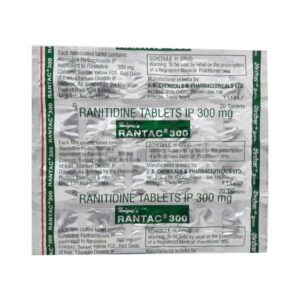
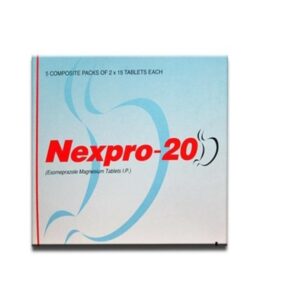


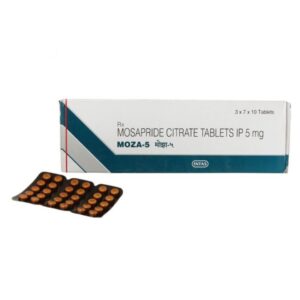
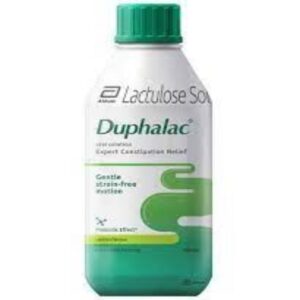
Leave a Reply
You must be logged in to post a comment.